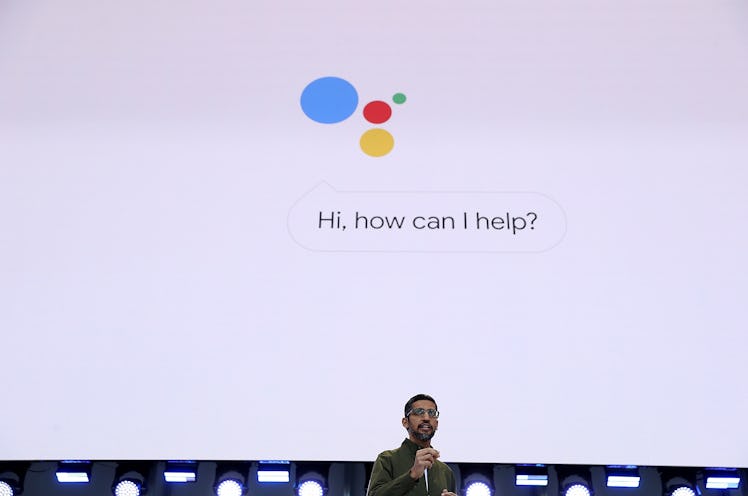
The Google Assistant Can Make Phone Calls & It's Freaking A Lot Of People Out
Google debuted a startling new feature at a conference on Tuesday, May 8 that has convinced me the robots are going to take over pretty soon. In a scene that could be ripped from a science-fiction horror movie, Google Assistant's eerily human artificial intelligence (AI) voice demonstrated a new feature that lets it make phone calls for you to complete rudimentary tasks like scheduling appointments. So yeah, the Google Assistant can make phone calls, and it's freaking a lot of people out.
The tech company unveiled the new feature, called Duplex, at their annual Google I/O conference on May 8, per The Verge, and the demonstration was met with gasps and applause from the audience (which is also somewhat disturbing). During the demonstration, the assistant called a restaurant to make a reservation for four people. It even used very human “um” and “mm-hmm" pauses while talking to the hostess, who seemingly has no idea that she's talking to a robot. (There is reportedly a version of the virtual assistant that will have John Legend's voice. I am shooketh.)
To some, it just seemed like a cool demonstration of technology. But to others, the robot-calling feature raises a whole host of ethical questions, and it comes at a time when our trust in technology and reality (think: Fake News!) is fraying.
The Verge laid out several ethical concerns, including: Should Google have to tell people they’re talking to a machine? Does technology that mimics humans erode public trust? Is this an instance of privilege, in which wealthier or powerful people can deflect boring conversations they don’t want to have to a machine?
Google claims that the assistant can only operate in specific parameters, seemingly to assuage some of those concerns. "Duplex can only carry out natural conversations after being deeply trained in such domains," a Google AI blog post reads. "It cannot carry out general conversations." It is also important to note that this a project in testing and not yet a product that you can use.
Duplex was designed to mimic human speech much more smoothly, according to Google's engineers, and the examples online sound frighteningly real. The assistant can handle far more complicated interactions with human beings than previously thought possible. Google engineers said of previous automated calling systems in a blog post, "In particular, automated phone systems are still struggling to recognize simple words and commands. They don’t engage in a conversation flow and force the caller to adjust to the system instead of the system adjusting to the caller."
Duplex will make its call from an outside number at its human's request, but the human operator won't be able to listen in or intervene, Google said, calling the project "fully autonomous." The system is programmed to identify the tasks it cannot complete autonomously (e.g., scheduling an unusually complex appointment). In these cases, it can refer the call back to the person who assigned the task.
Zeynep Tufecki, an associate professor at the University of North Carolina's School of Information and Library Science, took to Twitter to voice her concern. She tweeted,
Google Assistant making calls pretending to be human not only without disclosing that it's a bot, but adding 'ummm' and 'aaah' to deceive the human on the other end with the room cheering it ... horrifying ... As digital technologies become better at doing human things, the focus has to be on how to protect humans, how to delineate humans and machines, and how to create reliable signals of each—see 2016. This is straight up, delilberate deception. Not okay.
“This technology is amazing, and [a] big step forward, but I don't think the main goal of AI should be to mimic humans,” Erik Brynjolfsson, a Massachusetts Institute of Technology professor told The Washington Post. “Instead, AI researchers should make it as easy as possible for humans to tell whether they are interacting with another human or with a machine.”
These kinds of ethical questions about the role of technology are becoming increasingly prevalent and will likely be ones that millennials and future generations are left to grapple with. I want to throw my phone in the garbage.